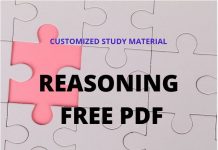Directions for Questions 1 to 15 : Read the paragraph and select the alternative which would complete the paragraph most appropriately.
1. In the evolving world order, the comparative advantage of the United States lies in its military force. Diplomacy and international law have always been regarded as annoying encumbrances, unless they can be used to advantage against an enemy. Every active player in world affairs professes to seek only peace and to prefer negotiation to violence and coercion——————-
a. However, diplomacy has often been used as a mask by nations that intended to use force.
b. However, when the veil is lifted, we commonly see that diplomacy is
understood as a disguise for the rule of force.
c. However, history has shown that many of these nations do not practice what they profess.
d. However, history tells us that those who intend to use violence profess peace.
e. However, when unmasked, such nations reveal a penchant for the use of force.
2. I am sometimes attacked for imposing ‘rules’. Nothing could be further from the truth. I hate rules. All I do is report on how consumers react to different stimuli. I may say to a copywriter, “Research shows that commercials with celebrities are below average in persuading people to buy products. Are you sure you want to use a celebrity?” Call that a rule? Or I may say to an art director, “Research suggests that if you set the copy in black type on a white background, more people will read it than if you set it in white type on a black background.”———-
a. Guidance based on applied research can hardly qualify as ‘rules’.
b. Thus, all my so called ‘rules’ are rooted in applied research.
c. A suggestion perhaps, but scarcely a rule.
d. Such principles are unavoidable if one wants to be systematic about consumer behavior.
e. Fundamentally it is about consumer behavior — not about celebrities or type settings.
3. Age has a curvilinear relationship with the exploitation of opportunity. Initially, age will increase the likelihood that a person will exploit an entrepreneurial opportunity because people gather much of the knowledge necessary to exploit opportunities over the course of their lives, and because age provides credibility in transmitting that information to others. However, as people become older, their willingness to bear risks declines, their opportunity costs rise, and they become less receptive to new information.———-
a. As a result, people transmit more information rather than experiment with new ideas as they reach an advanced age.
b. As a result, people are reluctant to experiment with new ideas as they reach an advanced age.
c. As a result, only people with lower opportunity costs exploit opportunity when they reach an advanced age.
d. As a result, people become reluctant to exploit entrepreneurial opportunities when they reach an-advanced age.
e. As a result, people depend on credibility rather than on novelty as they reach an advanced age.
4. The audiences for crosswords and sudoku, understandably, overlap greatly, but there are differences, too. A crossword attracts a more literary person, while sudoku appeals to a keenly logical mind. Some crossword enthusiasts turn up their noses at sudoku because they feel it lacks depth. A good crossword requires vocabulary, knowledge, and mental flexibility and sometimes even a sense of humor to complete. It touches numerous areas of life and provides an “Aha!” or two along the way.————–
a. Sudoku, on the other hand, is just a logical exercise, each one similar to the last.
b. Sudoku, incidentally, is growing faster in popularity than crosswords, even among the literati.
c. Sudoku, on the other hand, can be attempted and enjoyed even by children.
d. Sudoku, however, is not exciting in any sense of the term.
5. Most firms consider expert individuals to be too elitist, temperamental, egocentric, and difficult to work with. Force such people to collaborate on a high-stakes project and they just might come to fisticuffs. Even the very notion of managing such a group seems unimaginable. So most organizations fall into default mode, setting up project teams of people who get along nicely.———–
a. The result, however, is disastrous
b. The result is mediocrity.
c. The result is creation of experts who then become elitist.
d. Naturally, they drive innovations.
6. Federer’s fifth grand slam win prompted a reporter to ask whether he was the best ever. Federer is certainly not lacking in confidence, but he wasn’t about to proclaim himself the best ever. “The best player of this generation, yes”, he said. “But nowhere close to ever. Just look at the records that some guys have. I’m a minnow.”—————-
a. His win against Agassi, a genius from the previous generation, contradicts that.
b. Sampras, the king of an earlier generation, was as humble.
c. He is more than a minnow to his
contemporaries.
d. The difference between ‘the best of this generation’ and ‘the best ever’ is a matter of perception.
7. Thus the end of knowledge and the closing of the frontier that it symbolizes is not a looming crisis at all, but merely one of many embarrassing fits of hubris in civilization’s long industry. In the end, it will pass away and be forgotten. Ours is not the first generation to struggle to understand the organizational laws of the frontier, deceive itself that it has succeeded, and go to its grave having failed.———-
a. One would be wise to be humble.
b. But we might be the first generation to actually reach the frontier.
c. But we might be the first generation to deal with the crisis.
d. However, this time the success is not illusory.
8. Many of us live one-eyed lives. We rely largely on the eye of the mind to form our images of reality. It is a mechanical world based on fact and reason. (_______). So today more and more of us are opening the other eye, the eye of the heart, looking for realities to which the mind’s eye is blind. This is a world warmed and transformed by the power of love, a vision of community beyond the mind’s capacity to see. Either eye alone is not enough. We need “whole sight”, a vision of the world in which mind and heart unite.
a. It had led to unprecedented scientific growth and material well being.
b. In the nuclear age, our mind-made world has been found flawed and dangerous, even lethal,
c. The question is irrelevant, whether or not they can be seen and reasoned.
d. We have built our lives based on it because it seemed predictable and safe.
9. People arguing for a position have been known to cast the opposite in an unnecessarily feeble light. (______). People who indulge in this fallacy may be fearful or ignorant of a strong counter argument. Detecting this fallacy often depends on having already heard a better refutation, or having information with which to construct one.
a. Casting the opposite as weaker than it really is, is a very effective strategy.
b. This portrayal of a refutation as weaker than it really is, is a sure way of proving your point.
c. Casting the opposite as weaker than it really is, is not a very effective strategy.
d. This portrayal of refutation as weaker than it really is, is unwarranted.
10. The question of what rights animals should enjoy is a vexatious one. Hundreds of millions of animals are put to death for human use each year.
Contrariwise, it can be argued that slowing down scientific research would retard discovery of antidotes to diseases such as cancer which kill humans and animals alike. (_________). What if super intelligent beings from Alpha Centauri landed on earth and decided to use us for their experiments, arguing that they could save far more of their and our lives by so doing?
a. It will benefit both in the long run.
b. Is the argument truly fair to animals?
c. But the progress of human civilization cannot be made contingent on some
hypothetical rights of animals.
d. There is no question of equating human rights with those of animals.
11. A deliberation is a form of discussion in which two people begin on different sides of an issue. (_______) Then each decides, in the light of the other argument whether to adopt the other position, to change his or her position somewhat, or to maintain the same position. Both sides realize that to modify one’s position is not to lose; the point is to get closer to the truth of the matter.
a. Each person argues his or her position most sincerely.
b. The prerequisite for deliberation to be productive is that persons involved must keep an open mind.
c. The purpose is to resolve the issue to the satisfaction of both parties.
d. The trick is to state your viewpoint from a position of strength.
12. When we call others dogmatic, what we really object to is ———–.
a. Their giving the dog a bad name
b. Their holding dogmas that are different from our own
c. The extremism that goes along with it
d. The subversion of whatever they actually believe in concomitantly
13. I am an entertainer (______), I have to keep smiling because in my heart laughter and sorrow have an affinity.
a. Even if I have tears in my eyes
b. Even though I am depressed inside
c. While entertaining people
d. In the entertainment business
14. The stock markets (______). The state they are in right now speaks volumes about this fact.
a. Is the barometer of public confidence
b. Are the best indicators of public sentiment
c. Are used to trade in expensive shares
d. Are not used to taking stock of all markets
15. Political power is just as permanent as today’s newspaper. Ten years down the line, (_______) the most powerful man in any state today.
a. Who cares
b. Nobody will remember what was written in today’s newspaper or
c. Few will know, or care about
d. When a lot of water will have passed under the bridge, who will care












